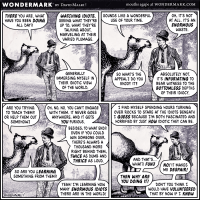I’ve been talking to idiots, part I
Published by marco on
 Wondermark: Gaping at the VapidSo here we are, six weeks in to a lockdown of society and slowdown of the economy, due to a particularly nasty virus. We knew it was coming, just like Japan and California know that an earthquake is in the offing. Unlike for earthquakes, we didn’t really prepare too well for pandemics. How could you? Until one happens, you just look like Cassandra. Why waste all of that money and restrict all of those freedoms for something that might happen? We don’t know when, we don’t know how severe, so YOLO.
Wondermark: Gaping at the VapidSo here we are, six weeks in to a lockdown of society and slowdown of the economy, due to a particularly nasty virus. We knew it was coming, just like Japan and California know that an earthquake is in the offing. Unlike for earthquakes, we didn’t really prepare too well for pandemics. How could you? Until one happens, you just look like Cassandra. Why waste all of that money and restrict all of those freedoms for something that might happen? We don’t know when, we don’t know how severe, so YOLO.
Freedom: You keep using that word. I do not think it means what you think it means[1]
People all over the so-called civilized world are complaining about the loss of freedom entailed by COVID-containment measures. They’re getting impatient. They can’t understand that the world has changed (perhaps temporarily) and that, for right now, we’re not in charge. We don’t determine when things happen.
It’s like with climate change: if the sea level rises, you move away from the coast. If there’s radiation, you wait for it to dissipate. If there’s an asteroid strike coming, you drink. With this virus, we have some control over the shape of the impact, but we can’t prevent it from happening. We can’t just wish it away after a few weeks because it’s bothersome.
We can wish it wasn’t the way it was, but we should be very careful about listening to quacks and crackpots telling us the story that we want to hear: that it could be all over and we overreacted and it serves us right for not having listened to them in the first place. The first wave of those idiots have already fallen. Others are spared from the effects of their own advice and live on to be stupid another day.
I just heard a couple of DJs on Swiss radio say that, when the measures are loosened on Monday, they plan to go out and buy a whole bunch of hand-sanitizer, etc. They even joked about turning around and selling it for a profit.
This is where the wheels come off of the freedom train. The freedom to do whatever you want is contingent on you doing it in a way that doesn’t impinge on everyone else’s freedom to do the same. On a high level, society imposes rules and regulations and laws to shape a way of life with the desired balance of well-being, happiness and freedom for the people that matter. Optimally, that’s everyone. Practically…not so much.
These factors depend on each other and they are prioritized in different ways by different societies, which is why there is no one, single, acceptable solution for everyone. The propaganda within which one steeps is crucial in determining which measures you’re willing to not only put up with, but consider to be unimpeachable. This is why different countries have different reactions.
So, if people start to exercise their freedom in ways that impinge on others, but are still within the bounds of the current rules and regulations, it is society’s job to adjust its rules and regulations to restore balance. This can happen when something like COVID smashes everything to bits or when people just start to develop new habits, like when society does its job too well and people take the comfort that their framework of laws provides for granted and then think that they can just get rid of the framework. You can try—and it might even work, at first—but it’s most likely to fail, because herds don’t do too well without fences. Temporarily, yes; but, in the long run, they’re all over the place. Chaos.
So, back to the whining about loss of freedom because stores are imposing limits on purchases or the government is restricting price-gouging or limiting groups of people or determining how many people can be in a store or canceling concerts or handing out tickets. This feels like a limitation on freedom imposed on you, personally, by the government. It is not. It is the government reasonably employing a new—and, in most cases, temporary—regulation, to address a new—and (hopefully) temporary—situation imposed by an agency not under anyone’s control (COVID, in this case).
Your freedom is defined by the rules and the situation. If there’s enough food for everyone, then you can eat all you want. If there isn’t, then you can’t. Anything else is immoral. When society or the government prevents you from exercising a freedom that no longer fits the current situation—which was caused by no-one—then it’s not the government that’s the asshole: it’s you.